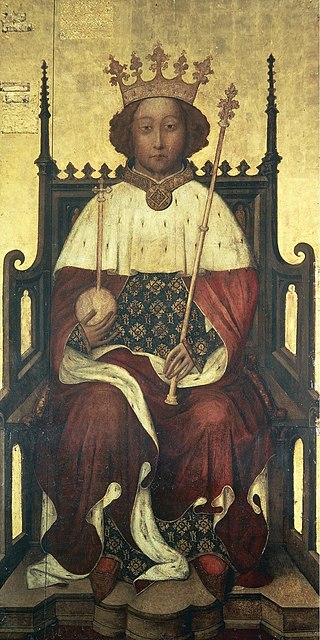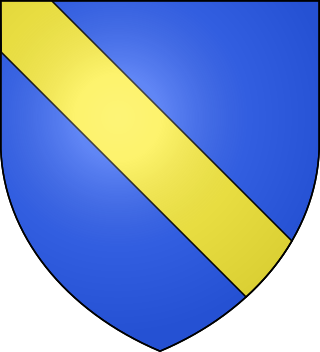
Richard II, also known as Richard of Bordeaux, was King of England from 1377 until he was deposed in 1399. He was the son of Edward, Prince of Wales, and Joan, Countess of Kent. Richard's father died in 1376, leaving Richard as heir apparent to his grandfather, King Edward III; upon the latter's death, the 10-year-old Richard succeeded to the throne.

The Life and Death of King Richard the Second, commonly called Richard II, is a history play by William Shakespeare believed to have been written around 1595. Based on the life of King Richard II of England, it chronicles his downfall and the machinations of his nobles. It is the first part of a tetralogy, referred to by some scholars as the Henriad, followed by three plays about Richard's successors: Henry IV, Part 1; Henry IV, Part 2; and Henry V.

Thomas de Mowbray, 1st Duke of Norfolk, KG was an English peer. As a result of his involvement in the power struggles which led up to the fall of King Richard II, he was banished and died in exile in Venice.

Thomas of Woodstock, Duke of Gloucester was the fifth surviving son and youngest child of King Edward III of England and Philippa of Hainault.

Ralph Neville, 1st Earl of WestmorlandEarl Marshal, was an English nobleman of the House of Neville.
John Holland, 1st Duke of Exeter, 1st Earl of Huntingdon, KG, of Dartington Hall in Devon, was a half-brother of King Richard II (1377–1399), to whom he remained strongly loyal. He is primarily remembered for being suspected of assisting in the downfall of King Richard's uncle Thomas of Woodstock, 1st Duke of Gloucester (1355–1397) and then for conspiring against King Richard's first cousin and eventual deposer, Henry Bolingbroke, later King Henry IV (1399–1413).

The Lords Appellant were a group of nobles in the reign of King Richard II, who, in 1388, sought to impeach some five of the King's favourites in order to restrain what was seen as tyrannical and capricious rule. The word appellant — still used in modern English by attorneys — simply means '[one who is] appealing'. It is the older (Norman) French form of the present participle of the verb appeler, the equivalent of the English 'to appeal'. The group was called the Lords Appellant because its members invoked a procedure under law to start prosecution of the King's unpopular favourites known as 'an appeal': the favourites were charged in a document called an "appeal of treason", a device borrowed from civil law which led to some procedural complications.

William le Scrope, Earl of Wiltshire, King of Mann was a close supporter of King Richard II of England. He was a second son of Richard le Scrope, 1st Baron Scrope of Bolton.
Thomas of Woodstock and Richard the Second Part One are two names for an untitled, anonymous and apparently incomplete manuscript of an Elizabethan play depicting events in the reign of King Richard II. Attributions of the play to William Shakespeare have been nearly universally rejected, and it does not appear in major editions of the Shakespeare apocrypha. The play has been often cited as a possible influence on Shakespeare's Richard II, as well as Henry IV, Parts 1 and 2, but new dating of the text brings that relationship into question.
Events from the 1390s in England.
Sir Peter Buckton was an English politician, soldier and knight from the eponymous village of Buckton near the town of Bridlington in Yorkshire. He was the High Sheriff of Yorkshire for the year 1404 and was also a member of parliament for Yorkshire three times. In the latter years of his life he also held significant positions such as the Mayor of Bordeaux and Ambassador to Castile.

Sir Henry Redford or Retford was a Knight of the Shire, Sheriff of Lincolnshire and the Speaker of the House of Commons.

John Doreward was a Serjeant-at-law and Speaker of the House of Commons of England.
Sir William Bagot was a politician and administrator under Richard II.
Sir Henry Green, JP was a courtier and councillor to king Richard II of England.
Robert Waterton was a trusted servant of the House of Lancaster under three monarchs, Henry IV, Henry V, and Henry VI. As Constable of Pontefract Castle, he had custody of Richard II after that king was deposed.
Sir Hugh Waterton, was a trusted servant of the House of Lancaster.
Sir Walter Devereux of Bodenham and Weobley was a prominent knight in Herefordshire during the reigns of Richard II and Henry IV. He represented Hereford in Parliament, and gave rise to the Devereux Earls of Essex and Viscounts of Hereford.

Sir Robert Cary of Cockington, Devon, was twelve times Member of Parliament for Devon, in 1407, 1410, 1411, May 1413, April 1414, Mar. 1416, 1417, 1419, May 1421, 1422, 1425 and 1426. Much of his later life was devoted to regaining the many estates and other landholdings forfeited to the crown following his father's attainder in 1388. He was an esquire in the households of King Richard II (1377–1399) and of the latter's half-brother John Holland, 1st Duke of Exeter.










